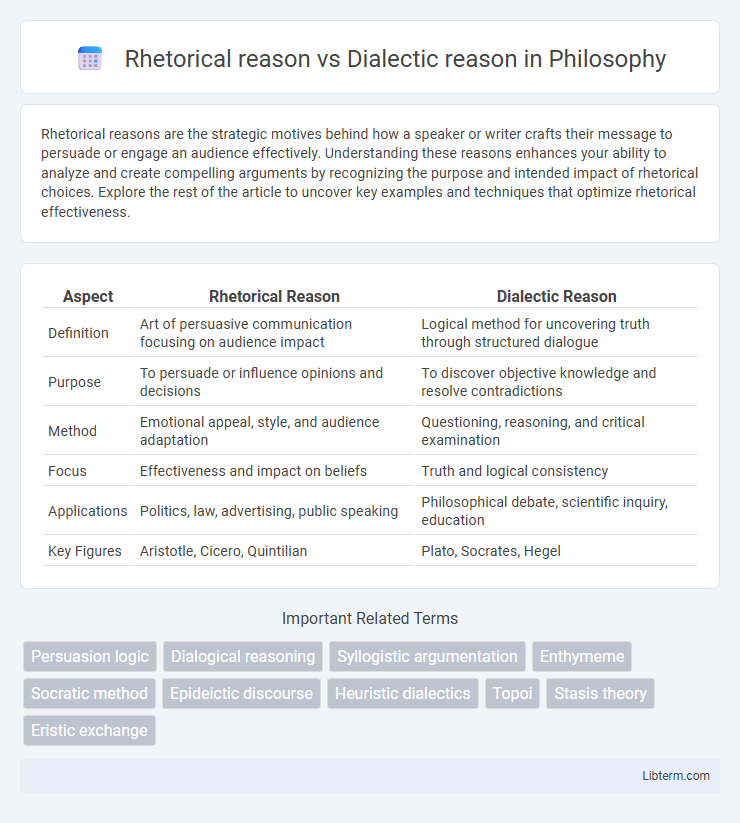Rhetorical reasons are the strategic motives behind how a speaker or writer crafts their message to persuade or engage an audience effectively. Understanding these reasons enhances your ability to analyze and create compelling arguments by recognizing the purpose and intended impact of rhetorical choices. Explore the rest of the article to uncover key examples and techniques that optimize rhetorical effectiveness.
Table of Comparison
| Aspect | Rhetorical Reason | Dialectic Reason |
|---|---|---|
| Definition | Art of persuasive communication focusing on audience impact | Logical method for uncovering truth through structured dialogue |
| Purpose | To persuade or influence opinions and decisions | To discover objective knowledge and resolve contradictions |
| Method | Emotional appeal, style, and audience adaptation | Questioning, reasoning, and critical examination |
| Focus | Effectiveness and impact on beliefs | Truth and logical consistency |
| Applications | Politics, law, advertising, public speaking | Philosophical debate, scientific inquiry, education |
| Key Figures | Aristotle, Cicero, Quintilian | Plato, Socrates, Hegel |
Understanding Rhetorical Reason
Rhetorical reason emphasizes persuasion through emotional and ethical appeals, targeting the audience's values and beliefs to influence decision-making effectively. It leverages language, style, and delivery to shape opinions and motivate action, often prioritizing practical impact over strict logical consistency. Understanding rhetorical reason involves recognizing its role in crafting messages tailored to specific audiences, making it essential in communication, politics, and marketing.
Exploring Dialectic Reason
Dialectic reason centers on structured dialogue aimed at uncovering truth through logical argumentation and critical questioning, fostering deeper understanding and philosophical inquiry. It relies on systematic examination of opposing viewpoints, encouraging coherent, rational debate to resolve contradictions and refine ideas. This method is foundational in classical philosophy and contemporary critical thinking for developing sound reasoning and knowledge validation.
Historical Origins of Rhetoric and Dialectic
Rhetorical reason traces back to ancient Greece, particularly the sophists who emphasized persuasion and effective communication in public speaking, as documented by Aristotle in "Rhetoric." Dialectic reason originated with Socratic dialogue and Plato's Academy, focusing on logical argumentation and uncovering truth through questioning and critical discussion. These historical origins illustrate rhetoric's link to audience influence and dialectic's foundation in structured reasoning and philosophical inquiry.
Key Differences Between Rhetoric and Dialectic
Rhetorical reason emphasizes persuasion through emotional appeal, stylistic strategies, and audience adaptation, while dialectic reason prioritizes logical argumentation, critical questioning, and the pursuit of truth through structured dialogue. Rhetoric seeks to influence beliefs and actions by crafting compelling narratives, whereas dialectic aims to uncover contradictions and refine understanding via systematic debate. The key difference lies in rhetoric's focus on effecting consensus or decision and dialectic's focus on deepening knowledge and resolving disagreements through reasoned discourse.
The Role of Persuasion in Rhetorical Reason
Rhetorical reason centers on persuasion by appealing to emotions, ethics, and logic to influence an audience's beliefs and actions, contrasting with dialectic reason which emphasizes structured dialogue and logical consistency to seek truth. The role of persuasion in rhetorical reason is crucial as it employs ethos, pathos, and logos to craft compelling arguments tailored to specific audiences and contexts. This strategic use of persuasive techniques differentiates rhetorical reason from dialectic reason's focus on objective analysis and argumentative rigor.
The Pursuit of Truth in Dialectic Reason
Dialectic reason centers on the rigorous pursuit of truth through structured dialogue, emphasizing logical argumentation and critical examination of ideas. Unlike rhetorical reason, which aims to persuade and appeal to emotions, dialectic reason prioritizes the uncovering of objective knowledge by engaging opposing viewpoints in systematic debate. This method fosters deeper understanding by challenging assumptions and refining concepts until arriving at well-substantiated conclusions.
Applications of Rhetorical Reason in Modern Discourse
Rhetorical reason emphasizes persuasion through emotional appeal, narrative techniques, and audience engagement, making it essential in political speeches, marketing campaigns, and social media discourse. Its application enhances the effectiveness of communication by tailoring messages to audience values, beliefs, and expectations, thereby influencing public opinion and decision-making processes. Unlike dialectic reason, which prioritizes logical argumentation and truth-seeking, rhetorical reason aims to motivate action and foster consensus in diverse communicative contexts.
Dialectic Reason in Academic and Philosophical Contexts
Dialectic reason in academic and philosophical contexts involves structured dialogue aimed at uncovering truth through logical argumentation and critical examination of differing viewpoints. It emphasizes the use of rational discourse to resolve contradictions and refine ideas, often employed in Socratic methods and scholarly debates. This approach contrasts with rhetorical reason, which prioritizes persuasion over objective truth, highlighting dialectic reason's foundational role in developing coherent and substantiated knowledge.
Strengths and Limitations of Rhetorical vs Dialectic Reason
Rhetorical reason excels in persuasive communication by appealing to emotions and audience values, making it effective in public speaking and marketing, yet it can lack rigorous logical structure and may prioritize persuasion over truth. Dialectic reason emphasizes logical consistency and critical examination, fostering deeper understanding through dialogue and debate, but it can be less engaging and slower in reaching consensus. While rhetorical reason thrives in shaping opinions quickly, dialectic reason is stronger in developing well-founded knowledge, highlighting the complementary nature of both approaches in discourse.
Integrating Rhetorical and Dialectic Approaches in Communication
Integrating rhetorical and dialectic approaches enhances communication effectiveness by combining persuasive techniques with logical reasoning, fostering clarity and audience engagement. Rhetorical reasoning appeals to emotions and values, while dialectic reasoning emphasizes systematic inquiry and critical dialogue, creating a balanced argumentative framework. This synergy supports nuanced understanding, enabling communicators to adapt messages to diverse contexts and interlocutors.
Rhetorical reason Infographic

 libterm.com
libterm.com